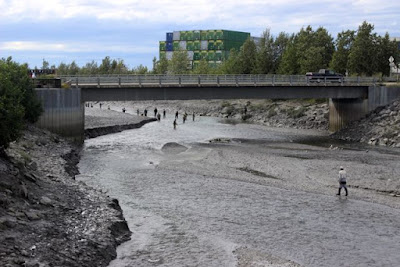Stand for Salmon is a group that got an initiative onto the November ballot that would better protect salmon habitat in Alaska. An industry group, made up of mining and other resource extraction companies, is calling themselves
Stand for Alaska, to oppose Ballot Initiative 1.
I haven't read through the initiative - it's about eight pages long. I can do that. But it was disqualified by the Lt. Governor (who supervises elections) and Stand for Salmon sued. The Alaska Supreme Court has now ordered the initiative to be on the ballot, but with some changes. We have to wait to see what the Lt. Governor's elections team does before we can know exactly what will be on the ballot initiative. My basic understanding is that the initiative would bring back some of the protections Alaskans had before the legislature
failed to renew our Coastal Zone Management Program. The elimination of the program, which gave coastal communities much more say in projects, was supported by resource extraction organizations that didn't like all the public participation that slowed down or ended their project approval processes. But that's my general impression and I have to get into the details soon.
In the meantime,
you can start at Ballotopedia which gives much better coverage than I could give at this point.
All this introduction leads into the Salmon BBQ that Stand For Salmon threw at the Cuddy Family Park, Friday evening to celebrate
Alaska Wild Salmon Day. (Yes, that's a state recognized day.)

I was asked to help out at the
Citizens Climate Lobby table and when I arrived, there was already a
large crowd walking around and lining up for BBQ salmon. (Salmon was free, beer you had to pay for.)
I also brought along my voter registration forms. I figured this would be a good place to register folks. The first person I asked had moved up from California and hadn't registered here yet. Bingo. He had an Alaska drivers license. But then, everyone else I asked was already registered, many in other states or countries. Then folks told me they thought everyone was registered because of the automatic voter registration when you apply for the Alaska Permanent Fund check. I'd forgotten about that. Here's what
the Permanent Fund Website says:
"On November 8, 2016, Alaska voters approved Ballot Measure 1 (15PFVR) which will automatically register eligible individuals to vote when they apply for a Permanent Fund Dividend (PFD), unless they opt-out. The Division of Elections webpage has more information.
A mailer from the Division of Elections will be sent to Alaskans who applied for their PFD from March 1, 2017 (effective date) to March 31, 2017 and whose address on their PFD application is different than their voter record address, or to applicants who are not currently registered to vote."
So Alaska has taken a different direction from a lot of other states that are trying to purge folks from the voting lists. The only eligible unregistered voters are those who are turning 18 since the last PFD check and people who just moved to Alaska and haven't filed for the PFD check yet. And, of course, those few folks who don't apply for their checks. I'm guessing any way. I have to check Monday with the elections office. I also want to know how to register homeless folks. I'm sure they've figured this out, but address is a mandatory
There were lots of tables with information from various non-profit organizations like CCL. There was music, and, of course, the salmon.
I did get one more voter registered - a 20 year old who was in line waiting for his salmon. He said he wasn't interested in registering and when I asked why not, his answer didn't make sense to me, so I pushed a bit. "It doesn't matter if I vote." I responded that the people who didn't vote could have changed nearly every race if they had vote. He still wasn't interested in voting. "If you register, you don't have to vote. But if you don't register and you change your mind, you won't be able to vote." His response was that he didn't have time to register. Now I had him. "You're waiting in line to get free salmon. You can fill out the form before you get your salmon." And he took the form and pen and filled it out. The couple behind him, when he gave the form back to me, congratulated him on registering to vote.

I talked to a lot of folks, including one gentleman who had three expensive looking cameras wrapped around him. He's a photographer from London who's in Alaska talking to people about their views on climate change. He was amazed at some of the folks in Utqiaġvik (formally Barrow) who didn't believe that climate change was caused by humans. When I asked more, he did say they worked for or had worked in the oil industry. The photographer, Laurence Ellis, said this was for
Document Journal. He sounded like someone who was worth noting here. At the very least, he will be interpreting his version of Alaska to the world. I only wish I'd worked a little harder when i took his picture with my low end Canon Powershot.
Toward the end of the event, everyone was invited for a giant photo of the event. I'd guess most people had already left. But there was still a good crowd.
[UPDATE August 13, 2018: Coincidentally,
the next post turned out to be about standing for salmon literally.]

 Then today we took them to the Garden and added them to their collection.
Then today we took them to the Garden and added them to their collection. 




































